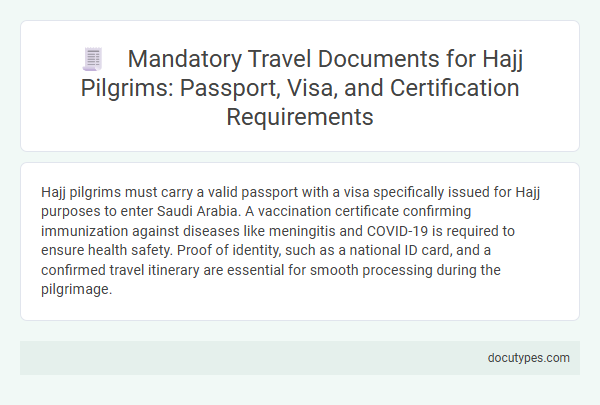Hajj pilgrims must carry a valid passport with a visa specifically issued for Hajj purposes to enter Saudi Arabia. A vaccination certificate confirming immunization against diseases like meningitis and COVID-19 is required to ensure health safety. Proof of identity, such as a national ID card, and a confirmed travel itinerary are essential for smooth processing during the pilgrimage.
Overview of Essential Travel Documents for Hajj
Hajj pilgrims must prepare several essential travel documents to ensure a smooth pilgrimage experience. These documents are crucial for legal entry into Saudi Arabia and fulfilling religious obligations.
- Hajj Visa - A special visa issued by the Saudi government allowing entry for pilgrimage purposes.
- Passport - A valid passport with at least six months' validity from the date of travel is mandatory.
- Vaccination Certificate - Proof of required vaccinations, such as meningitis and COVID-19, is necessary for health compliance.
Passport Requirements for Hajj Pilgrims
Hajj pilgrims must possess a valid passport with a minimum validity of six months beyond the date of their intended travel to Saudi Arabia. This ensures seamless entry and exit during the pilgrimage period.
Visas specific to Hajj travel are issued only with a valid passport, affirming the pilgrim's identity and eligibility. Pilgrims are advised to verify that their passport information matches their Hajj visa documents to avoid travel delays.
Hajj Visa Application Process and Guidelines
Hajj pilgrims must obtain specific travel documents to perform the pilgrimage legally. The most crucial document is the Hajj visa, issued exclusively by Saudi Arabian consulates.
The Hajj visa application process requires a valid passport with at least six months' validity beyond the travel date. Pilgrims must also submit proof of vaccination, round-trip airline tickets, and confirmed accommodation details.
Key Certification Requirements for Hajj Travel
Hajj pilgrims must prepare specific travel documents to comply with Saudi Arabian regulations and ensure a smooth pilgrimage experience. Proper certification and documentation are mandatory for entry, health, and identification verification during Hajj travel.
- Hajj Visa - Required for all pilgrims, this visa authorizes entry to Saudi Arabia specifically for the Hajj pilgrimage period.
- Valid Passport - A passport with at least six months of validity from the date of travel is essential for identification and international clearance.
- Vaccination Certificate - Proof of prescribed vaccinations, including meningitis and COVID-19 immunizations, is mandatory to protect public health during Hajj.
Vaccination Certificates Needed for Hajj Entry
Hajj pilgrims must present specific travel documents to gain entry into Saudi Arabia, including valid passports and visas. Among these, vaccination certificates hold critical importance, ensuring health safety during the pilgrimage.
The Saudi Ministry of Health mandates proof of vaccination against meningococcal meningitis, influenza, and COVID-19 for all pilgrims. You must obtain these certificates from authorized health centers before traveling. Failure to provide valid vaccination proof may result in denied entry at the port of arrival.
Additional Permits and Approvals for Pilgrims
Hajj pilgrims must secure several essential travel documents beyond the basic visa to ensure a smooth pilgrimage. These additional permits and approvals are critical for legal and logistical compliance during Hajj.
- Hajj Visa - Issued by the Saudi Ministry of Hajj, this visa is mandatory for entry into Saudi Arabia for pilgrimage purposes.
- Vaccination Certificate - A certificate proving mandatory vaccinations such as meningitis and COVID-19 is required for all pilgrims.
- Ihram Permit - Authorization for wearing the Ihram clothing in designated locations, ensuring compliance with ritual requirements.
Securing these additional permits ahead of travel helps pilgrims avoid delays and ensures a hassle-free Hajj experience.
Document Validity and Expiry Considerations
| Travel Document | Validity Requirements | Expiry Considerations |
|---|---|---|
| Passport | Must be valid for at least six months beyond the Hajj travel date. | Passports expiring before or during Hajj will lead to travel denial. |
| Hajj Visa | Issued specifically for Hajj pilgrimage; validity aligned with Hajj season dates. | Visa validity typically limited; cannot be used for travel outside designated Hajj period. |
| Vaccination Certificate | Proof of mandatory vaccinations, such as meningitis, valid as per health authority guidelines. | Certificates must be current; expired vaccination documentation is unacceptable for entry. |
| Travel Insurance | Recommended to have coverage valid throughout the pilgrimage duration. | Expired insurance policies do not provide coverage during Hajj activities. |
| Airline Tickets | Confirmed tickets with travel dates matching Hajj schedule. | Expired or unused tickets may cause travel disruptions or denial of boarding. |
Common Mistakes in Hajj Travel Documentation
What travel documents are mandatory for Hajj pilgrims to avoid common mistakes? Hajj pilgrims must carry a valid passport, a Hajj visa issued by the Saudi consulate, and a vaccination certificate proving meningitis immunization. Many pilgrims overlook the necessity of an exit/re-entry permit from their home country and correct vaccination documentation, leading to travel delays and denied entry.
Tips for Organizing and Securing Your Documents
Hajj pilgrims must secure essential travel documents including a valid passport, Hajj visa, and vaccination certificates before departure. Organize these documents in a dedicated travel folder or digital app to prevent loss and ensure quick access during the journey. Verify the authenticity and expiration dates of all documents well in advance to avoid last-minute issues at immigration checkpoints.
Which Travel Documents Are Mandatory for Hajj Pilgrims? Infographic

